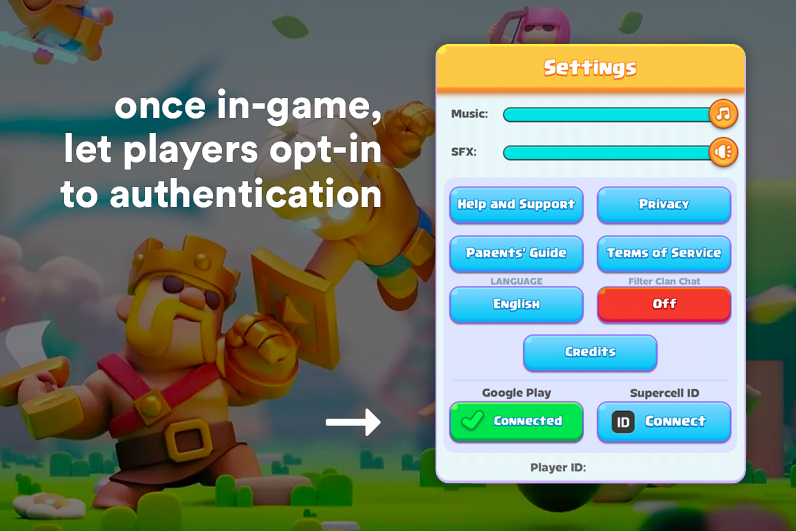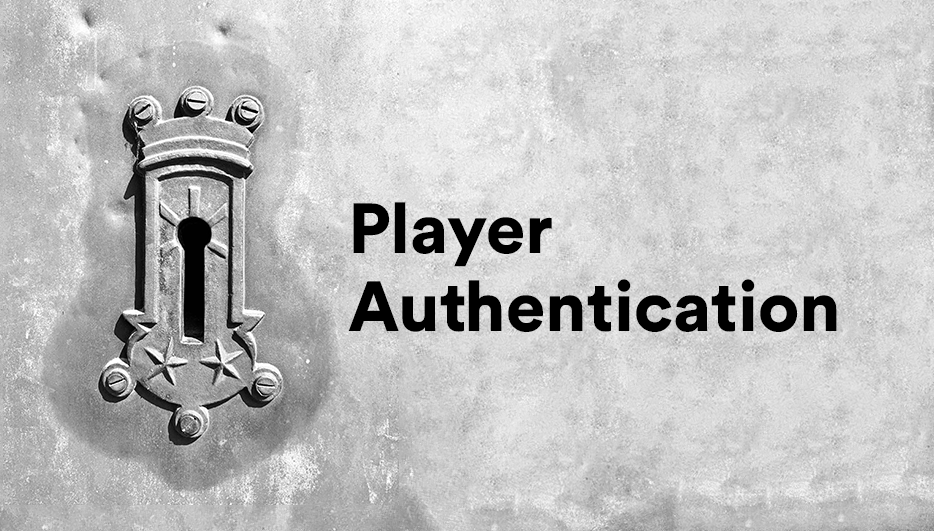Verifying exactly who your players are unlocks a whole load of new game features and possibilities, many of which can dramatically increase the commercial success of your game. That makes getting it right critically important. However, what works for one game might not be ideal for another. Some will want to authenticate their players by having them login to a game-specific account, while others will not want to interrupt the time-to-game flow.
That, understandably, can leave many developers scratching their heads. Fortunately, this doesn’t have to be as complicated as it may initially seem, thanks to LootLocker’s various out-of-the-box authentication methods.
In terms of video games, ‘authentication’ describes the process of confirming the details of a player, and it comes in a number of flavors. There isn’t a single approach that is universal to all games. In some cases, you’ll absolutely want to provide the capacity for players to create personal accounts and sign-in as themselves when they play. It’s also possible to authenticate the player using the platform ID they’re playing on, like Steam, Xbox, or PlayStation. For other titles, however, an anonymous guest login may be best, as it creates an anonymous profile linked to the player’s device. That’s why at LootLocker our backend technology provides the capacity for all of these options.
But how do you know which will deliver what you and your player community need? Here we’ll consider three popular forms of authentication that bring value to game developers and publishers.
Authentic Potential
If your game intends to embrace cross-platform, you’ll almost certainly want to let players create personal accounts so they can login as themselves. That’s true whether your take on cross-platform involves online multiplayer, interaction between users across multiple device types, or even online leaderboards.
Allowing or requiring a player to pick a username and password essentially lets users log in to your game as if it were a platform, regardless of what device or operating system they happen to be playing on. Authentication of this kind keeps things simple and straightforward for both your studio and your players. It is tremendously powerful – and largely essential – in a cross-platform context, whether you’re matchmaking, letting players create and trade items, supporting in-game purchases and microtransactions, or hoping to build a proactive, interactive community.
Supporting personal account sign-up can also prove helpful in terms of engaging and retaining your players. At a fundamental level, the simple act of creating an account can cement a connection with your players – particularly if there are bonuses or rewards for sign-up. Done right, this kind of authentication can make your users feel special, committed, and involved, lifting and extending retention. That makes it a great tool for community building, and can also help with your efforts to form a connection with players and keep them updated with the likes of game news and offers.
LootLocker’s White Label Login feature makes it incredibly straightforward for developers to offer players the chance to sign-up to a game-specific account and enjoy all the benefits of this approach to authentication. Take a look at our documentation if that sounds like it could work for you.
Guests of Honor
For many games – and particularly those on mobile – you may instead want to offer the option of anonymous guest sign-up. This approach effectively bypasses authentication, enabling players to start your game without running it via a platform such as Steam. This presents a powerful option for mobile games, where you won’t get platform information directly when the player starts the game.

That’s why at LootLocker we provide the Guest Login feature as an alternative to White Label Login, letting you assign the player an ID in place of a personal account. Or LootLocker can handle assigning those IDs on your behalf. Again, our documentation provides a wealth of detail on the Guest Login functionality.
After being assigned an anonymous ID as a form of basic account, your players are free to dive in, get playing, return to saved games, and enjoy a range of online and backend features. In the mobile space where keeping onboarding simple and friction minimal is key to gaining audience, guest sign-up is not just powerful, but can prove a significant force in letting your game build momentum and retain a growing user base. Once your game has players highly engaged, you will want to offer them ways to authenticate themselves in your game so they don’t lose their account if they delete your app or reset their device; a native feature we’ll offer soon through LootLocker.
Anonymous guest login is also extremely useful when you are early in your development cycles, yet to integrate with a platform, and primarily need to test your game with a backend. Switching from Guest Login to another authentication method is simple and straightforward.
The Power of Platforms
The other predominant form of authentication supported by LootLocker is Platform Account authentication. Essentially, with this approach LootLocker lets you use the account an individual player creates across the platform they are playing on to authenticate them - so perhaps a PlayStation user’s PSN account, or a Steam user’s Steam account. This requires no game-specific sign-up or additional steps for the players - in fact, they likely won’t even give it much thought. But Platform Account authentication does let the game create an account for the player in an entirely secure way, in the background. As long as the player is logged into their platform account when starting the game they'll automatically get authenticated on LootLocker and can access their account in the game, giving you and them all the advantages of authentication.
While each platform has its own nuanced authentication system we've gone ahead and simplified everything for you to make it quick and easy to use. Check out our documentation to learn more about Platform Account authentication.
Bringing Your Ambition to Life
Clearly, the way you choose to authenticate your players is important, and there are multiple gains to getting it right. In an online world of connected, maintained games that exist as live entities, you’ll almost certainly want to provide some form of player account functionality, personal or anonymous.
Furthermore, we now exist in a time when major platform holders are more open to cross-platform than ever before. As such, those at the early stage of a game’s design and production may want to consider how they can embrace cross-platform – as long as it really does compliment what you are creating. With an approach like White Label Login, you can let individual players take their account across multiple platforms – or even track early adopters so you can reward their dedication. You might, for example, want to give early access sign-ups special cosmetic items so they can assert their status within online matches and across the community.
Think of authentication as a creative and commercial opportunity. It isn’t just a piece of backend admin, but rather a means to support your ideas, bring your game new features and functions that match your creative ambition, support your game as a business, and - most importantly - connect your players to your game in a way where you stay in control.
That, of course, is true of almost everything that backends offer. A quality backend is what powers your online matches, community functions, ability to monetize, and much more besides. If you’ve got any questions about authenticating, backends generally, or what LootLocker specifically offers, please don’t hesitate to get in touch by heading over to our Discord – and we’d be delighted to help you.
